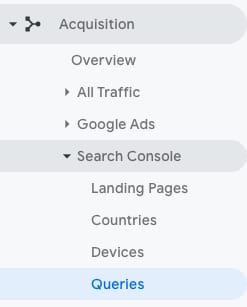It’s easy to get tunnel vision when thinking about organic and PPC strategy. While they play in the same space, often different agencies (or people) are driving strategy and day to day tasks are very different. I’m sure you know the general statistics that they compliment each other but as PPC account managers, how often do you poke your head into the world of organic search?
Google has done research showing that paid search drives an average 89% incremental clicks over organic meaning you’re likely not going to cannibalize yourself. From the SEO perspective, Moz has a great overview of how organic and PPC interact in the SERP.
There is a whole lot to think about but there is one easy place you can start to start bridging the gap between these two online sources of traffic. This blog will cover a way to use your organic traffic as a source of new keywords to expand your paid coverage.
Finding Areas of Opportunity:
In Google Analytics, make your way down to the queries tab under Search Console. Here you’ll find a list of all organic queries driving traffic to your website along with impressions, average position, and clicks.

You’re going to see a lot of brand clicks and impressions but there is a lot of value when you start looking at non-brand terms. We’ll get into two ways to parse the data here in a moment.
Google Webmasters is another area you can explore if you have access to it (or can get the data sent over).
Supplementing a Strong Ranking:
When you download or sort your organic data by clicks, you’re finding areas that you are likely already performing strongly in. Think of these keywords as opportunities to complement a strong ranking. This gives users double the opportunity to click to your website. On competitive non-brand terms, this extra traffic can be invaluable in converting additional people.
While every industry can benefit from this, if you’re in a competitive market space (B2B SaaS, Healthcare) this can really pay dividends when building up your qualified sales funnel. Also, keep in mind the statistic that Paid Search leads to an average of 89% additional clicks.
Underrepresented Keywords:
If you sort by impressions, your goal should be to uncover underrepresented keywords. Here you can supplement your average or poor organic ranking with an ad in the paid search results.
This can give you visibility where you’re currently exposed, especially if you uncover some higher volume keywords that are highly relevant to your business. I would also place a priority on boosting your organic ranking to start tapping into the expected results mentioned above.
Final Thoughts:
Organic and PPC are often siloed but they can really benefit your digital strategy if you are working towards a common, greater goal. As a fellow Hanapin account manager said, paid and organic results are indistinguishable. Your goal should be increasing the bottom line for the business not just your channel.




